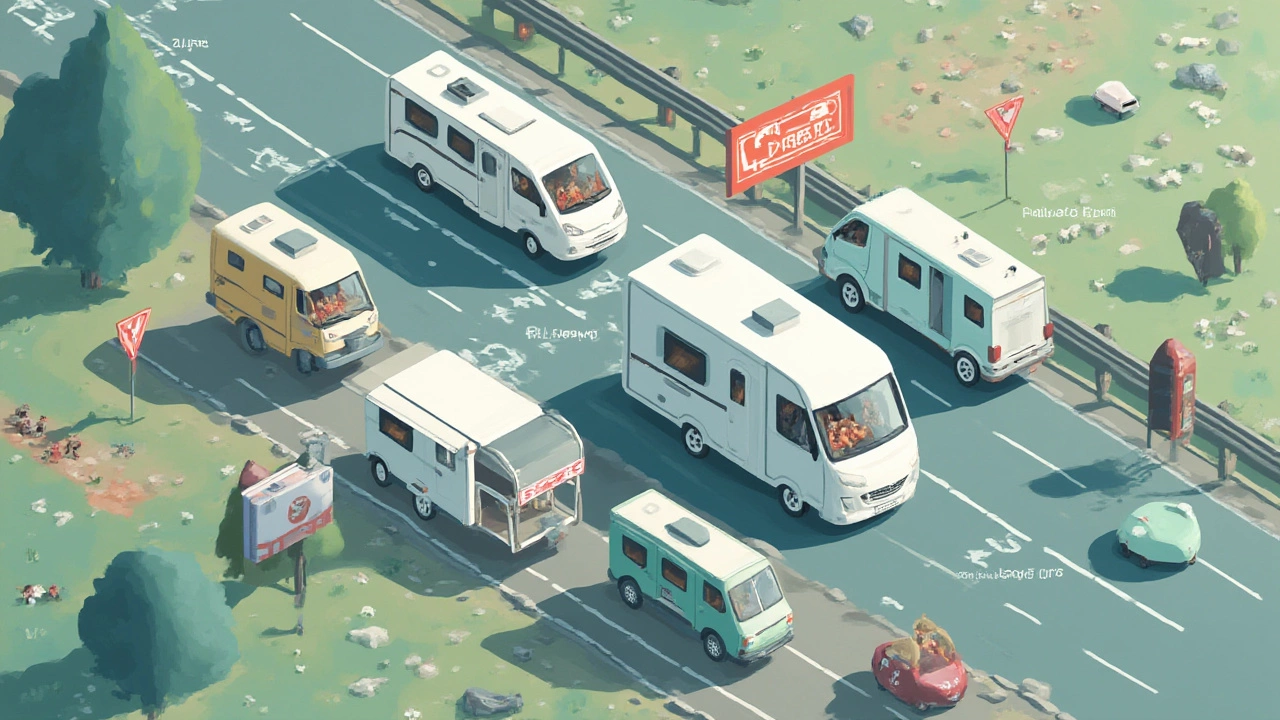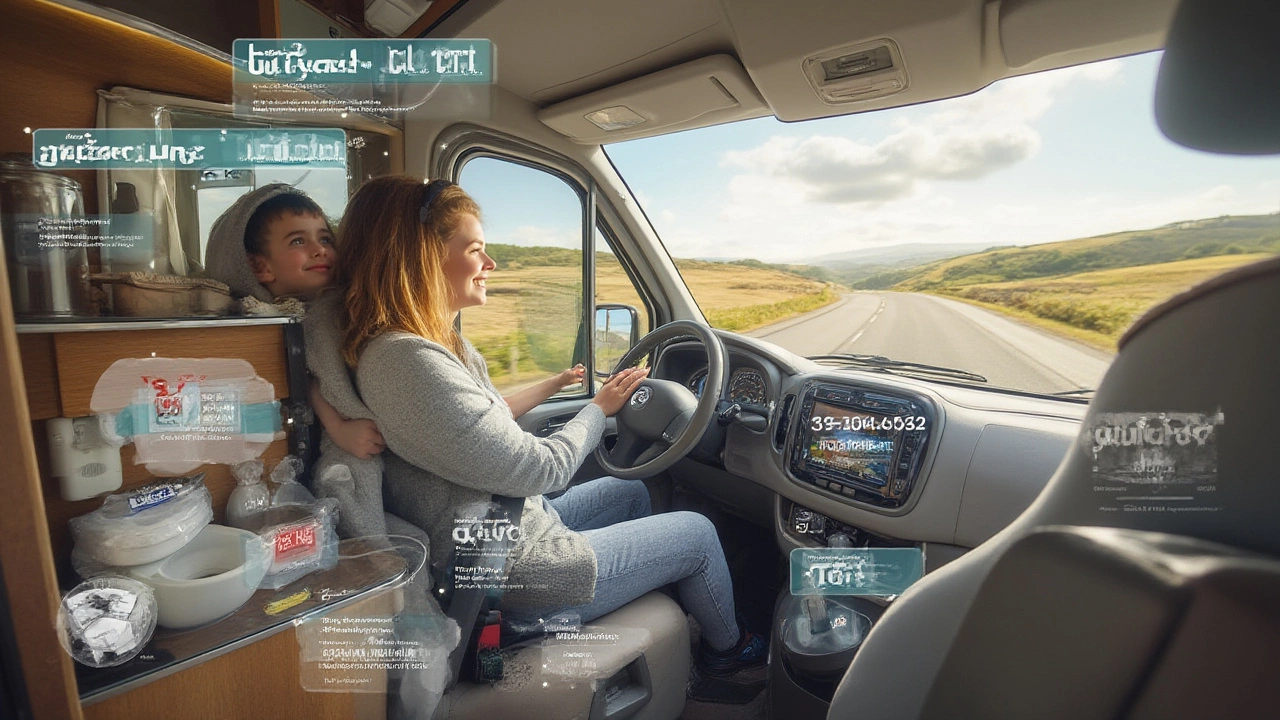Imagine you’re barrelling down the motorway, enjoying freedom on four wheels when suddenly… nature calls. We’ve all been there. If you’re lucky enough to have a motorhome, that on-board toilet can start to look like the Holy Grail—no rest stop needed. But just because the toilet is there, does that mean you can actually use it while the motorhome is moving? People have all kinds of stories, and myths float around like confetti at Glastonbury. Here’s what’s really going on.
What Motorhome Toilets Are Built For
First, let’s clear up what a motorhome toilet actually is. Most UK rigs use either a cassette toilet or a built-in flushing system, both perfectly capable of dealing with typical restroom duties. They work great while you’re parked up at a campsite, but their design isn’t focused on withstanding the chaos of a moving vehicle. Sure, the bowl holds fluids, and the seals should stop leaks during travel, yet they don’t come equipped with automotive seat belts or airbags. These loos are about convenience, not crash protection.
What about the plumbing? The pipes, tanks, and connections are usually tested for the bumps and shakes of the average UK road but think about what happens to liquid contents if you suddenly slam on the brakes or hit a giant pothole. The truth is, while the toilets may be handsomely bolted down, their contents (and you, if perched on the throne) are subject to every jolt and swerve. The tank can handle a standard ride, but nowhere in the manual does it say, “Perfectly safe during a hairpin turn at 60 mph!”
Ever heard of anyone trying it? Veteran vanlifers will have at least one story about a brave soul dashing to the loo while the wheels are rolling. Sometimes it ends with triumphant relief; other times, someone’s mopping up a spilled chemical mess from the floor. It’s not the routine use case, and even those who claim “it’s fine” usually add a long list of caveats.
So, while the physical toilet doesn’t mind if the engine’s running, the practical risks start to multiply once the rig’s rolling. Let’s see what the law says and what can go wrong.
Legal Stuff: Are You Even Allowed?
This is where things get serious. The UK doesn’t have a law that says, “You must not use the motorhome toilet while driving.” But the rules around seat belt use are very clear. If your motorhome was manufactured after 2006 and has a designated seat fitted with a belt, you must wear it while driving on public roads. In a nutshell, you’re not allowed to unbuckle “just to nip to the loo” unless you’re in a historic vehicle, sit in a place without a seat belt, or you’re parked. The police are well within their rights to fine you if you’re caught moving about in the cabin. Some insurance fine print even excludes coverage if someone’s injured while out of their seat during travel.
Let’s get even more specific. If you, your kid, or anyone else wanders down the aisle to use the toilet while the vehicle’s moving, and you have seat belts, you’re breaking the law. Even if you get away with it, if an accident happens—even a minor fender-bender—the person in the loo could get properly hurt. At 50 mph, your body won’t politely stay put; you could get thrown around like a pair of wet wellies at a music festival. Injury stats back this up. According to UK Department for Transport figures, unrestrained passengers have a much greater chance of suffering serious injury in a crash compared to those buckled in. No surprise there.
Older vans sometimes lack belts in the back. If you’re rolling in a classic ‘van, the legality gets murky. Still, is it smart to use the facilities en route? Even if there’s a loophole, insurers may see it otherwise. Some insurers reject claims if someone was using the toilet because it’s considered an “unsafe occupation” while driving. Want to check? Look in your motorhome insurance policy under “exclusions”—most have a section saying claims are void if seat belts were available but not worn.
Most EU countries have even stricter seat belt laws. If you’re motoring across the Channel (even though Brexit has muddied a lot of rules), you’ll run into spot checks, and the fines can pile up fast. Bottom line: seat belts trump comfort breaks on the move. Safety takes the front seat—literally.

Real Risks and Disasters: Why You Probably Shouldn’t Try It
You might think, “But what’s the worst that can happen? I’ll be quick!” Well, here’s the reality—things can unravel faster than a badly pitched tent. Most injuries inside motorhomes during road trips happen when someone’s walking around instead of sitting. A sudden swerve or emergency brake, and your body gets tossed. Now, if you’re sitting on a fixed toilet, hands on your knees, feet off the floor… you’ve basically turned yourself into a human bowling pin. The sharp edges of the bathroom, the hard counter surfaces, and good old-fashioned gravity all conspire against you.
Ever try to balance while wiping on a moving vehicle? Sounds funny, but it’s a recipe for faceplants. Spilled toilet chemicals, loose rolls, leaks—they happen. There are stories online of people having to sanitize not just floors but sleeping quarters too, after a poorly timed flush. One UK survey of motorhome owners found about 22% had experienced some kind of bathroom mishap on the road. That’s more than just anecdotal evidence, it’s a solid reminder that things go wrong even for seasoned travellers.
Then, think about those with children. Parents wrestle with this all the time, especially on long drives. Many report holding out until it’s safe to stop (sometimes a motorway layby isn’t glamorous, but it’ll do in a pinch) rather than risk it. Accidents can be worse for younger children—imagine trying to steady a child during a bumpy ride while they use the toilet. The risk just isn’t worth it.
Your vehicle could also get damaged. A sudden movement can snap plastic hinges, crack seals, or cause leaks that’ll haunt your nostrils until you get back to base. Spare a thought for your future self: cleaning a soaked wet room after a chemical spill is nobody’s idea of a relaxing road trip.
Smarter Ways to Manage Bathroom Breaks on the Go
So what should the seasoned motorhome traveller do? Plan your stops like a road trip ninja. Apps like Park4Night or Motorhome Stopover can guide you to safe and legal stopping places all over the UK and Europe. Stop at service stations with proper parking for larger vehicles—most of them have dedicated bays for motorhomes these days. Or make a habit of pulling over every couple of hours, even if you don’t feel the urge right then. It’ll stretch your legs, lower your accident risk, and save you from temptation.
Got little ones or people with medical needs? That’s probably the closest it gets to an exception, but it’s still technically against seat belt laws. In emergencies—say, someone’s in real distress—your safest bet is to pull over as soon as possible and deal with things while stationary. Trust me, most traffic police have kids too and appreciate when you wait before causing chaos in the back.
Some seasoned vanlifers keep a small emergency bottle or travel urinal at the ready for those “I can’t wait” moments. Not glamorous, but practical if you know you’ll be driving for ages between stops and you’re far from civilization. Store one in an easy-to-reach cubby (but definitely not in the fridge!) and keep toilet paper close by. It feels silly, but better safe than a crash report statistic.
Remember, planning for bathroom breaks is as crucial as checking oil or topping off your water tank. Consider the route, factor in traffic, and when in doubt, err on the side of caution. A five-minute pit stop could save you hours—if not days—of cleaning up or dealing with insurance headaches.
So, next time you’re tearing down the M6 and someone pipes up, “Can you use the motorhome toilet while driving?”, you’ll have the answer… and you’ll have a solid plan. Toilet break stories should be about funny signs you saw at the services, not about missed bends and chemical catastrophes.
